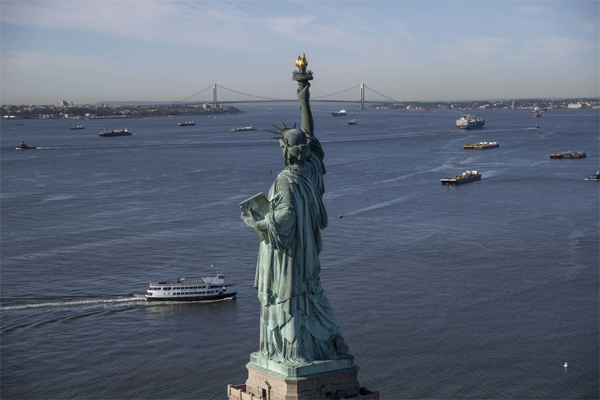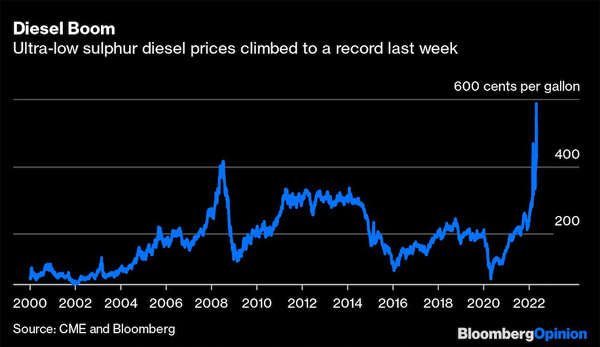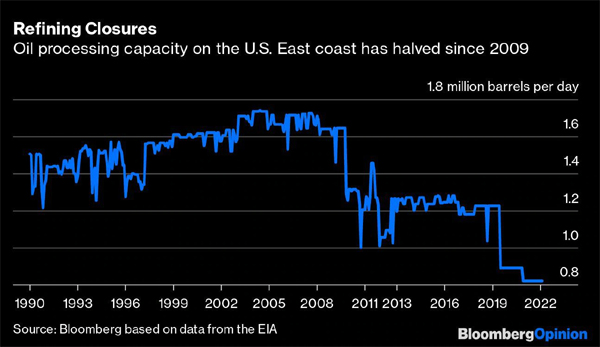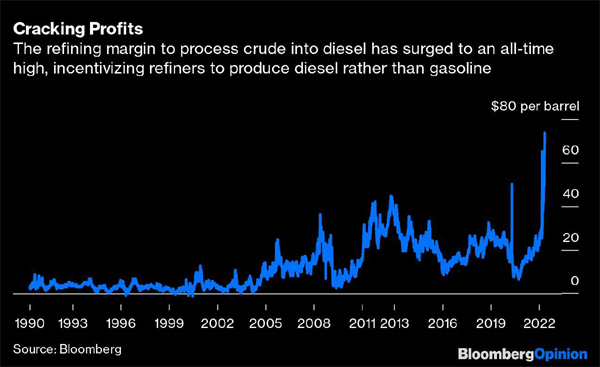
By Javier Blas
The horizon south of the Statue of Liberty is interrupted by the silhouettes of several oil-tank farms. New York harbor is the home of Wall Street and financial wizardry, but it’s also the place where old-school oil traders still buy and sell refined petroleum products the old way, by the gallon, setting benchmark prices. In the 1990s, Morgan Stanley’s Olav Refvik controlled so many of those tank farms that he was known as “the king of New York harbor.” If Refvik was still trading today, he would find his tanks nearly dry: Diesel, the harbor’s most basic fuel, is very scarce.
Last week, East coast inventories of diesel plunged to the lowest seasonal level since government records started more than 30 years ago. The shortage caused a crisis in the diesel market, sending wholesale and retail diesel prices to an all-time high. Diesel is today more expensive in America that it was in 2008, when the price of crude oil surged to nearly $150 a barrel compared with little more than $100 currently.

Diesel is the workhorse of the global economy. It’s used everywhere to keep trucks, tractors, freight trains and factories moving. And its ubiquity means the increase in its price will exacerbate global inflationary pressures.From central bank interest rates to supermarket prices, a lot hinges on diesel. On Tuesday, average U.S. retail diesel prices posted the fifth-consecutive fresh daily record, surging above $5.3 per gallon, up nearly 75% from a year ago. The price spike is worse on the Eastern seaboard, where diesel retails now for more than $6 per gallon, nearly double 2021’s price.The oil tanks in New York harbor are nearly empty for reasons both global and local. Around the world, diesel is in short supply as demand has surged well above pre-Covid levels, spurred by a boom in freight. The Russian invasion of Ukraine has tightened flows further, as Washington has banned imports of Russian petroleum. At the same time, the U.S. has become the barrel provider of last resort for many Latin American countries, with exports of gasoline, diesel and jet-fuel running at unusually high levels. But there’s a local problem too: East coast refining capacity has plunged over the last decade, leaving the region vulnerable to squeezes.In the past 15 years, the number of refineries on the U.S. East coast has halved to just seven. The closures have reduced the region’s oil processing capacity to just 818,000 barrels per day, down from 1.64 million barrels per day in 2009. Regional oil demand, however, is stronger.

The problem is even worse than those numbers suggest because several refineries are operating well below their typical capacity. For example, the Paulsboro refinery near Philadelphia isn’t running several units that could make diesel. Its owner, PBF Energy Inc., last week said that even if it wanted to operate them, it would probably struggle to do so at worthwhile capacity because it can’t import the semi-refined oil feedstock it once did from Russia. Moreover, Canadian refineries that once supplied the refineries have also closed in recent years, worsening the shortage.The diesel shortfall is nearing crisis levels. In the wholesale market, so-called ultra-low sulphur diesel in New York harbor last week changed hands for a record level of 585 cents per gallon, equal to $245 per barrel. Oil aficionados joked ULSD actually stood for ultra-low supply of diesel.With diesel prices at a record high, refineries are trying to produce the most they can. The financial incentive is there: The diesel crack margin – a simplified measure of the profit available for turning a barrel of crude into diesel – on Monday surged to a record $73.5 per barrel. The 2000-to-2020 average diesel crack stood at $15.7 per barrel. “Any refiner who knows anything about this business, and most of them do, is doing everything in their power to turn every drop of gasoline into a gallon of jet fuel or diesel,” said Thomas Nimbley, the chairman and chief executive of refiner PBF Energy.
While that may alleviate the diesel and jet-fuel supply crisis, it may spell trouble in the gasoline market in the next few weeks, just as demand starts to ramp-up with the arrival of the summer driving season in the U.S.Washington may need to intervene ahead of the winter, if not immediately. Diesel is used for both transportation and heating and, at current prices, many families in the northeast would struggle with heating bills. Since 2012, the U.S. government maintains a strategic reserve of one million barrels of ultra-low sulpur distillate fuel to address crisis like the current one. New York harbor holds 300,000 barrels on behalf of the U.S. Department of Energy, with another 300,000 in Groton, Connecticut, and another 400,000 in Boston. It isn’t a lot, but drawing on those reserves would help. Tapping those barrels to curb escalating diesel prices is becoming a question of when, rather than if.

___________________________________________________________________
Javier Blas is a Bloomberg Opinion columnist covering energy and commodities. He previously was commodities editor at the Financial Times and is the coauthor of “The World for Sale: Money, Power, and the Traders Who Barter the Earth’s Resources.” @JavierBlas.Energiesnet.com does not necessarily share these views.
Editor’s Note: This article was originally published by Bloomberg Opinion, on May 04, 2022. All comments posted and published on EnergiesNet.com, do not reflect either for or against the opinion expressed in the comment as an endorsement of EnergiesNet.com or Petroleumworld.
Use Notice: This site contains copyrighted material the use of which has not always been specifically authorized by the copyright owner. We are making such material available in our efforts to advance understanding of issues of environmental and humanitarian significance. We believe this constitutes a ‘fair use’ of any such copyrighted material as provided for in section 107 of the US Copyright Law. In accordance with Title 17 U.S.C. Section 107. For more information go to: http://www.law.cornell.edu/uscode/17/107.shtml.
energiesnet.com 05 9 20022












